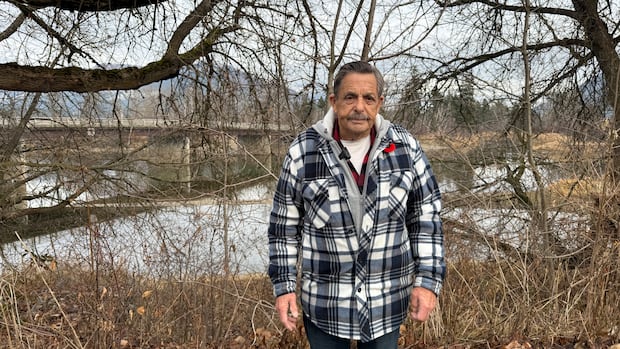British ColumbiaHunters with freezers full of meat in B.C.’s Okanagan say they feel left in the dark after the provincial government announced that it is investigating a potential case of chronic wasting disease.Chronic wasting disease may have been detected in a white-tailed deer near EnderbyListen to this articleEstimated 4 minutesThe audio version of this article is generated by text-to-speech, a technology based on artificial intelligence.David West is the president of the Enderby and District Game Club. (Jacqueline Gelineau/CBC)Hunters with freezers full of meat in B.C.’s Okanagan say they feel left in the dark after the provincial government announced that it is investigating a potential case of chronic wasting disease.On Nov. 24, the B.C. government informed the public it is investigating after abnormal proteins were found in the brain of a male white-tailed deer that was harvested east of Enderby.The sample has been submitted to the Canadian Food Inspection Agency for further testing, with results expected by early December.Chronic wasting disease is an infectious and fatal illness affecting species such as deer, elk, moose and caribou. It’s caused by an abnormal protein called a prion.David West, the president of the Enderby Fish and Game Club, says he found out about the potential case in his region through the newspaper.Cervidae is a family of hoofed ruminant mammals that includes moose, deer and elk. (Marcella Bernardo/CBC)As the president of a game club in Enderby, West said he feels uninformed and unprepared to answer questions about chronic wasting disease at his group’s monthly meeting. “We’re sort of left in the dark,” he said. “Like, is the animal a good animal to shoot or is it not?”There have been only six confirmed cases of chronic wasting disease in B.C., all from the Kootenay region, since 2024. As a result, testing in B.C. is only mandatory for hunters in the Kootenay region.Chronic wasting disease is found across Canada and the USA. (U.S. National Wildlife Health Center/Government of Canada)The B.C. government encourages hunters to voluntarily submit samples for free testing, and to report sick animals.West is concerned about those who don’t follow the news or use the internet on a regular basis. He said there has been no communication between the province and the game club. “I would like to see them have mandatory testing on these animals,” said West, who hopes a blanket rule would quell confusion and mitigate safety concerns.There is no direct evidence the disease can be transmitted to humans, according to the federal government. Similar prion diseases like mad cow disease can infect humans, causing neurological diseases like Creutzfeldt Jakob. WATCH | Chronic wasting disease in Alberta:Chronic wasting disease has exploded through Alberta’s deer populationIt attacks the brain, has a 100 per cent fatality rate, and is spreading quickly through Alberta’s deer population. Researchers across western Canada, including Sabine Gilch in Alberta, are working on a potential vaccine for this deadly wasting disease. She joined Edmonton AM to talk about her work. Jennifer Provencher, a research scientist with Environment and Climate Change Canada, said she would love to test every animal harvested in the country — but it is not feasible. Some provinces and U.S. states have enacted bans on the removal of carcasses from a restriction zone and implemented mandatory testing, but Provencher said resources are not in place to analyze the brain of every single hunted cervid in Canada.Provencher said when cervids migrate and travel across borders, they can spread prions through bodily fluids like saliva and urine. The prions can remain infectious in soil for many years.“Unlike viruses or bacteria who are very susceptible and vulnerable to breaking down through freeze-thaw cycles and other kind of natural exposures, the prions are actually much more persistent in the environment.”Jennifer Provencher is a research scientist with Environment and Climate Change Canada. Her student is seen analyzing samples under a fume hood. Provencher said the potential positive test is a sign that ‘the system seems to be working.’ (Submitted by Jennifer Provencher)While it may seem frightening, Provencher said the potential positive test in the Okanagan is actually a good sign. “The system seems to be working right. It would be more concerning if we were getting disease in humans and we didn’t know about in wildlife.”She said scientists know the disease is travelling slowly around the world, so finding evidence of an infection before an outbreak shows how well hunters and scientists are working together. She said testing for chronic wasting disease is accurate and important as animals in the early stages of infection may not display neurological symptoms.As part of B.C.’s surveillance and response plan for chronic wasting disease, an incident management team has been assembled to prepare for potential next steps.The province said it will engage with hunters and partner organizations to share information and guide the next phase of the response.
With hunting season still underway, hunters worry about potential case of chronic wasting disease in Okanagan











